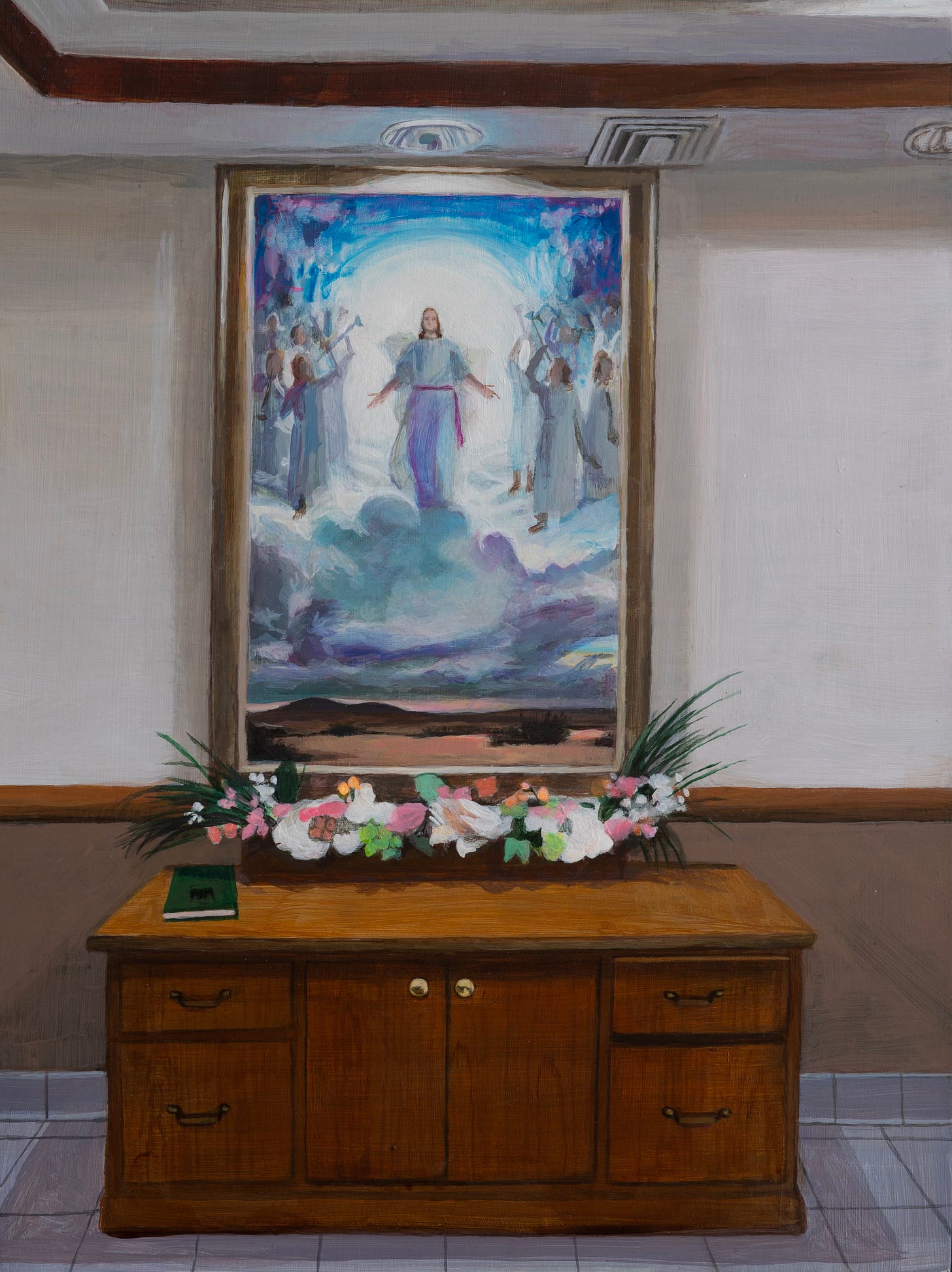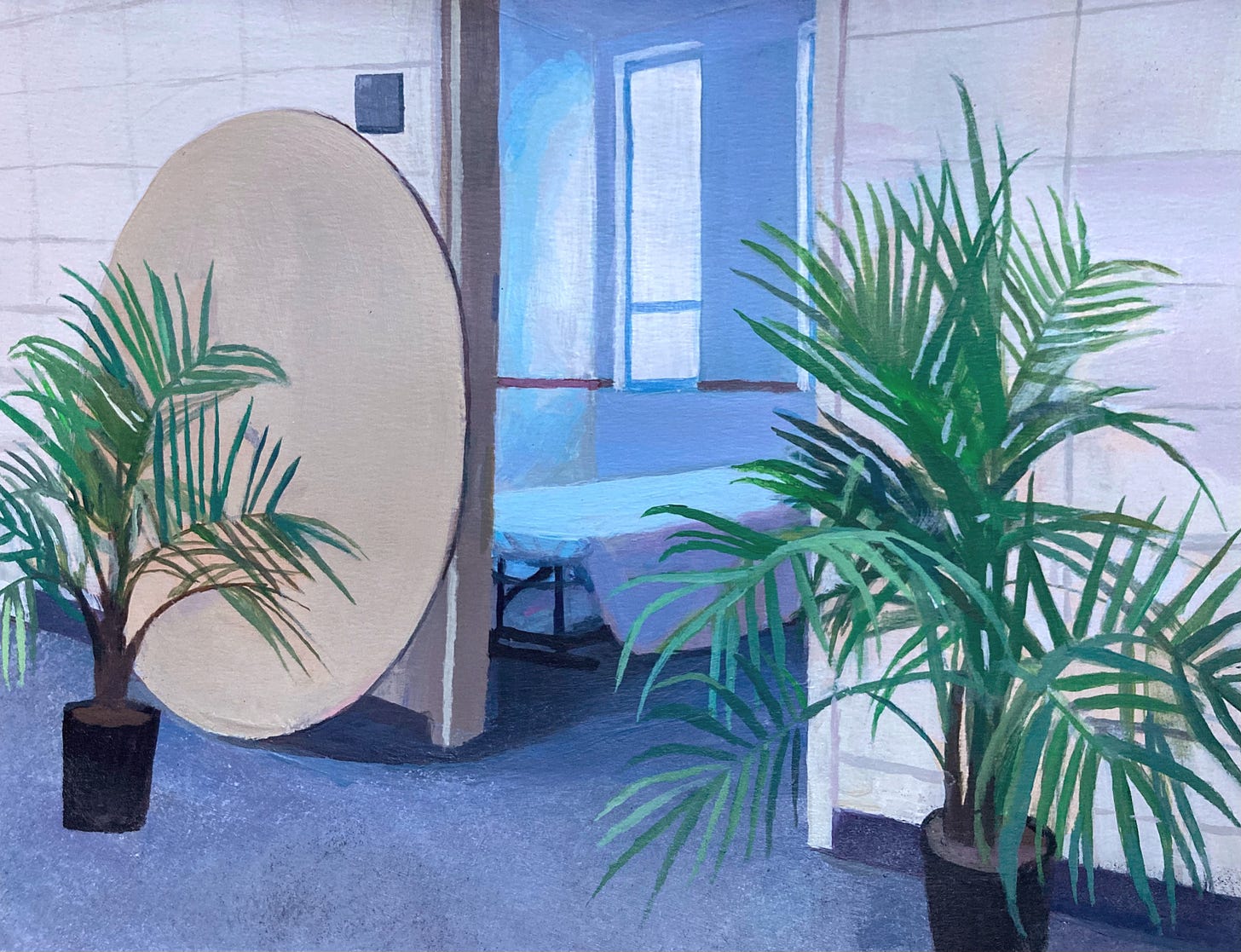Immanent Grace
A Liturgy for Ordinary Time
Now is the holy not afar In temples lighted by a star, But where the loves and labors are. Now that the King has gone this way, Great are the things of every day —Edwin Markham, “The Consecration of the Common Way”
Ordinariness gets a bad rap in our high-stakes marketing culture. To call a book or a movie “ordinary” is to say that it is not worth our time. Referring to a student or a job applicant as “ordinary” in a recommendation letter suggests that they are barely able to dress themselves. No university I have ever encountered would draft a mission statement promising all its students an “ordinary educational experience.” And few churches advertise themselves as “ordinary spiritual experiences for ordinary people living ordinary lives.” And yet, the vast majority of the time we spend on earth consists of doing ordinary things: eating, sleeping, shopping, doing dishes, mowing lawns, and chauffeuring children. Most of us will experience only a very few extraordinary moments in our lives. When we do, we will only know that they are extraordinary by comparing them to the many moments that are not.
We have a hard time celebrating ordinariness because, for solid evolutionary reasons, our brains crave novelty. New experiences are likely to contain threats we must pay attention to and opportunities to help us survive and reproduce. Our own brains reward us with generous amounts of dopamine when we seek, find, and pay attention to the new and exciting things in our environment. Ordinary sensations and experiences—things unlikely to pose new threats or present new opportunities—fade into the background so that we barely notice them. This way, we can focus the bulk of our attention on new potential threats and opportunities. It is all part of the efficient and ironclad logic of natural selection.
But the efficient and ironclad logic of natural selection does not care whether or not we are happy. It has no interest in our personal fulfillment, spiritual growth, or peace of mind. It cares only that we survive long enough to reproduce, which is the lowest bar imaginable for a happy life. Human flourishing does not require novelty, excitement, or exceptional experiences of any kind. It occurs in the orderly accumulation of ordinary moments. “How we spend our days,” writes Annie Dillard, is “how we spend our lives.”
Ordinariness is actually a profound human need. The word “ordinary” comes from the same root as the words “order,” and “ordain.” An ordinary life is one in which everything is in order, exactly the way it should be. An ordinary life is the kind of existence that God has ordained for human beings. In some religious traditions, an “ordinary” minister is a person who has been ordained to a specific task, while an “extraordinary minister” can only perform the task in a dire emergency. And if we really think about it, “ordinary times” are the best times to be alive.
The value of ordinariness became clear to me recently when we lived through one of the most extraordinary times in the world’s history, when the COVID-19 pandemic swept through the world, closing schools and businesses, shutting down travel, and disrupting lives on a scale not seen for a hundred years. Who among us did not long for the day when we could just live our normal lives once again?
During the early days of the pandemic, I read or reread some of the world’s great pandemic literature: Daniel Defoe’s Journal of the Plague Year, Edgar Allan Poe’s “Masque of the Red Death,” T.S. Eliot’s The Waste Land, and most importantly, Albert Camus’ The Plague—a book that I had read, enjoyed, and even taught to students twenty years earlier and had not looked at since. The Plague narrates the outbreak of bubonic plague in Oran—a North African town that Camus takes pains to present as painfully normal. “Its ordinariness,” he writes in the novel’s opening paragraph, “is what strikes one first about the town of Oran.” Camus initially hides the ball by using “ordinary” to mean unsophisticated, provincial, and boring. But the novel soon becomes a fictional laboratory in which the author deprives these ordinary people of their ordinariness and shows us how they respond. Some characters see the contest with the plague as a great battle and look for opportunities to display their heroism; others see it as a way to become rich by smuggling goods and people past the sentries set up to enforce a quarantine on the entire town. A local priest calls the plague divine retribution, and another character spends his time in quarantine working and reworking the first sentence of what he believes will be his great novel.
But the characters who matter the most— the ones that we might normally call the heroes of the story — are the people who show up every day during the plague and do their jobs. This includes Dr. Rieux, the novel’s main protagonist. But it also includes sanitation workers, merchants, city officials, and everybody else who commits, during an extraordinary time, to do ordinary things — things that just need doing so that life can go on in some semblance of an ordinary way. As the plague progresses, ordinariness becomes the town’s only salvation, as the greatest threat of the plague is its tendency to become the people’s only reality. When that happens — when the plague becomes normal — death is the only thing that people have to look forward to. Ordinariness becomes exceptional and vital, as it represents a life that is not governed by pestilence. In a discussion of heroism during the plague, Dr. Rieux objects that heroism suggests extraordinariness, while the town’s salvation lies in ordinariness:
“There’s no question of heroism in all this. It’s a matter of common decency. That’s an idea which may make some people smile, but the only means of righting a plague is, common decency.”
“What do you mean by ‘common decency’?” Rambert’s tone was grave.
“I don’t know what it means for other people. But in my case I know that it consists in doing my job.”
The movement that Camus documents—from the ordinary to the extraordinary and back again to the ordinary—is not without religious significance, or, at least, religious precedent. Most liturgical religions (a category that does not normally include The Church of Jesus Christ of Latter-day Saints) divide the year into three unequal sections. The Advent season begins on the fourth Sunday before Christmas and continues to the Feast of Epiphany on January 6. The Easter season begins on Ash Wednesday and continues to the Feast of Pentecost, forty-nine days after Easter. Everything else is called “Ordinary Time.” But not in a bad way. Ordinary Time derives its name from the tradition of using ordinal numbers to mark the passing of weeks: the first week of Ordinary Time, the second week of Ordinary Time, and so on, all the way to the thirty-third or thirty-fourth week, depending on how the lunar holidays line up in a particular year. In the liturgical sense, ordinary things are simply things that occur in a numeric order. This has nothing to do with being boring or plain.
But it does have something to do with being still, which, like seeking out ordinariness, is something that humans do very poorly. A wise and brilliant friend of mine once remarked that “we would rather do almost anything than sit still and examine the God-shaped holes in our hearts.”1 But this is precisely what Ordinary Time calls us to do. As the United States Conference of Catholic Bishops defines it, “Ordinary Time is a time for growth and maturation, a time in which the mystery of Christ is called to penetrate ever more deeply into history until all things are finally caught up in Christ.” Ordinary Time makes Advent and Eastertide remarkable by contrast, and it gives us the space and time to make those exceptional times part of our lived experience. Every day can’t be Christmas, nor should we want it to be. But the Christmas season does not really matter to us until we normalize its message and make it part of our ordinary lives. This is the point of the conclusion to W. H. Auden’s magnificent Christmas Oratorio, “For the Time Being”:
Well, so that is that. Now we must dismantle the tree,
Putting the decorations back into their cardboard boxes —
Some have got broken — and carrying them up to the attic.
The holly and the mistletoe must be taken down and burnt,
And the children got ready for school. There are enough
Left-overs to do, warmed-up, for the rest of the week —
Not that we have much appetite, having drunk such a lot,
Stayed up so late, attempted — quite unsuccessfully —
To love all of our relatives, and in general
Grossly overestimated our powers. Once again
As in previous years we have seen the actual Vision and failed
To do more than entertain it as an agreeable
Possibility. For years I imagined that Auden was chastising me for moving back to a normal life after feeling Christ’s spirit during the Christmas season. But Auden, a good Anglican, understood the concept of Ordinary Time. He knew that we cannot always live in an exceptional holiday world, for, if we did, Christmas would cease to be a special day. We can, though, use our ordinary moments and ordinary days to contemplate “the stable where for once in our lives / Everything became a You and nothing was an It.” This profoundly meaningful concept will change our lives once it becomes part of our ordinary understanding of the world.
One of the hallmarks of LDS worship during the Advent and Easter seasons is its lack of hallmarks. Most Latter-day Saints do not light candles during Advent or reflect on Christ’s Seven Last Words during Holy Week. We follow the largely secular gift-giving traditions associated with these holidays. In recent years, the Church has made a point of directing wards and branches to have tasteful and appropriate Christmas and Easter services, but we do not follow a weeks-long liturgical calendar the way that Catholics and many Protestants do. And that should not be a problem. It means Latter-day Saints have an abundance of Ordinary Time available for quiet contemplation about the Savior’s life and ministry. The liturgies of Ordinary Time encourage this kind of reflection and give worshippers the space and the time to contemplate the role of Christ in ordinary life.
Even though Latter-day Saints do not (outside of the temple) use a formal scripted liturgy, our sacrament meeting talks and Sunday School lessons often take on a liturgical character through their ordinariness and repetition. Unfortunately, the Latter-day Saint liturgy often ends up looking (incorrectly) like boredom. We show up week after week for sacrament meeting talks that cover the same few topics every week, and we attend testimony meetings that repeat the same three or four confessions of belief ad infinitum. We have coined the term “Sunday-school answers” for another weekly ritual that involves asking a highly anticipatable question (“How do we grow close to God?”) and responding with a set of standard responses (“pray,” “read the scriptures,” “follow the prophet”). What are these questions and answers but our version of a call-and-response liturgy? Like all liturgies, it presents the essential truths of our religion in a repetitive and participatory process that makes them part of our lives.
Humans have always used two different strategies to create sacred spaces for worship. Neither strategy is better than the other, and both can produce profound spiritual experiences. The first of these—let’s call it the “smells and bells” strategy—is to create an extraordinary space that pulls worshippers away from their ordinary lives. Such worship may occur in grand chapels full of beautiful artworks and services accompanied by grand and beautiful music. When someone attends Evensong at St. Paul’s Cathedral or Sunday Mass at St. Peter’s Basilica, they enter an otherworldly environment that separates them from the world and gives them a glimpse of a divine plane. Latter-day Saints use precisely this worship strategy in the temple.
Our weekly meetings, however, operate on a very different set of principles. They take ordinary things and invest them with extraordinary meaning. The young child who gives a thirty-second talk about their family prayers; the young father who bears a sincere testimony that the Lord led him to his eternal companion; the newly minted deacon who is not quite sure which row he is supposed to pass the sacrament to next; the primary chorister who successfully employs all the hand gestures for “Book of Mormon Stories” while a young child tugs at her skirt—these scenes are just as remarkable in their way as the magnificent choirs of St. Paul’s are in theirs. By their sheer ordinariness, they reinforce the powerful spiritual truth that God cares deeply about ordinary things.
This is perhaps the central insight of St. Ignatius Loyola, the founder of the Jesuit order. Ignatius believed that God could be found everywhere, in everything. Rather than trying to find the right place or environment to experience God, Ignatian spirituality encourages us to sit with everything we encounter in our everyday lives and contemplate it until we realize that we are in the presence of God. For the Ignatian, every ordinary thing is already part of God.
Latter-day Saint worship differs from Ignatian spirituality in one key area. Rather than finding the holiness that is already in ordinary things, Latter-day Saints invest ordinary things with deep cosmological significance. We create deep spiritual significance through acts of consecration. This, I think, is the special genius of our worship. Ordinary bread and water become profound mysteries, ordinary cooking oil becomes a powerful agent for healing through faith, and ordinary activities—doing laundry, mowing lawns, and chauffeuring children—can become vehicles through which Saints commune with each other to create the Kingdom of God.
As Latter-day Saints, we believe that we will build Zion by consecrating ordinary things to the Kingdom of God—including our ordinary selves. The Kingdom is not a holy place that we find or inherit. It is an ordinary place that we make holy through our constant attention to the purpose of our existence. Our ordinary planet will become a paradise, and ordinary people will become like God. This, too, will be ordinary in the original sense of the word; it is the state of existence that has been ordained since the foundations of the world. The Zion we build will be the culmination of ordinariness, which will become a thing of great beauty and eternal wonder.
Michael Austin is Academic Vice President and Provost at Snow College. His books include Re-reading Job: Understanding the Ancient World’s Greatest Poem and Vardis Fisher: A Mormon Novelist.
Art by Madeline Rupard.
Said wise and brilliant friend, Emily Hess-Flinders, wrote this in a personal communication on May 22, 2024.






